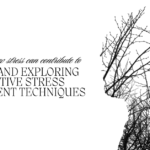
It’s normal to feel stressed and anxious on a daily basis in the fast-paced world of today. Workplace deadlines, peer pressure, or personal obstacles are just a few examples of the many ways that anxiety can appear and affect our general health. While experiencing occasional anxiety is normal, developing healthy coping mechanisms is crucial to preserving our sense of equilibrium and peace of mind. This blog will discuss useful methods for dealing with anxiety on a daily basis, enabling you to develop a calmer mindset and more easily handle life’s obstacles.
1. Engage in Mindfulness Meditation: This effective method for reducing anxiety and fostering mental clarity is mindfulness meditation. You can nurture inner calm and lessen tension and concern by paying attention to the here and now and monitoring your thoughts objectively. Every day, set aside a little period of time to engage in mindfulness meditation. You can use guided sessions, deep breathing techniques, or just sit quietly and watch your thoughts.
2. Establish a Daily Routine: By offering a sense of stability and predictability, routines and structure can help reduce anxiety levels in daily living. Set up a regular routine for things like getting out of bed, eating, exercising, and sleeping. Maintaining a schedule might help you feel less fatigued when making decisions and establish a sense of order that encourages emotions of peace and control.
3. Remain Active: Engaging in regular physical activity is critical for maintaining both your physical and mental well-being. It also helps you effectively manage stress and anxiety. Take part in the things you enjoy doing; this could be going on a stroll, doing yoga, or going to the gym. Exercise releases endorphins, which are natural mood lifters, and helps to reduce cortisol levels, the hormone associated with stress. Aim for at least 30 minutes of moderate exercise most days of the week to reap the full benefits.
4. Engage in Deep Breathing Exercises: These easy-to-do breathing techniques help to ease anxiety in the moment by calming the mind. To engage in diaphragmatic breathing, take a deep inhale via your nose, let your abdomen expand, and then gently release the breath through your mouth. Several times over, repeat this procedure while paying attention to how your breath feels entering and exiting your body. Calm and relaxation can be facilitated by deep breathing, which can help trigger the body’s relaxation response.
5. Reduce Exposure to Triggers: Recognise possible anxiety triggers and take proactive measures to reduce your exposure to them. This may involve setting boundaries with toxic relationships, avoiding certain environments or situations that exacerbate your anxiety, or limiting your consumption of news and social media. By minimizing exposure to triggers, you can reduce the frequency and intensity of anxious feelings and create a more supportive environment for your mental health.
6. Take Care of Yourself: Taking care of yourself is crucial to controlling your anxiety and promoting your general wellbeing. Make time for the things that make you happy and relax, such reading a book, having a bubble bath, or going outside. Make self-care routines that feed your mind, body, and soul a priority and incorporate them into your daily schedule.
7. Seek Support: If you’re feeling extremely anxious, don’t be afraid to ask for help. Speaking with a trusted friend or family member, getting advice from a therapist or counsellor, or joining a support
group are all effective ways to share your feelings with others and receive recognition, encouragement, and a different viewpoint. Remember, you’re not alone, and there are people who care about you and want to help you navigate through difficult times.
8. Practice thankfulness: You can change your attention from the things that are making you anxious to the good things in your life by adopting an attitude of thankfulness. Consider the things you have every day to be thankful for, such as your relationships, health, or even small pleasures like a hot cup of tea or a stunning sunset. Maintaining a thankfulness diary can assist in strengthening this routine and teaching your thoughts to recognise and value the richness in your life.
9. Set Realistic Goals: By breaking down difficult jobs into small chunks, realistic goal-setting can help reduce feelings of anxiety. Create a plan to achieve your values and priorities by identifying measurable, attainable, and detailed targets. Acknowledge your accomplishments as you go along and try not to be too hard on yourself if things don’t always go according to plan. Recall that every day presents an opportunity for learning and development, and that obstacles are an inevitable part of the road.
10. Show Compassion for Yourself: Lastly, remember to treat yourself with kindness and compassion while you are going through stressful or anxious times. Show yourself the same compassion and consideration that you would extend to a friend going through a comparable situation. Practice self-compassion by acknowledging your feelings without judgment, and remind yourself that it’s okay to ask for help and take things one step at a time.
It takes time, self-awareness, and a commitment to put your mental health first to manage anxiety on a daily basis. These useful hints and methods will help you develop a more tranquil mindset, strengthen your ability to bounce back from setbacks, and face every day with more assurance and serenity. It’s crucial to keep in mind that dealing with anxiety is a continuous process, so exercise patience and self-compassion while you go through the highs and lows of life. You can develop better self-care and inner calm as well as learn effective anxiety management with patience, practice, and assistance.
Conclusion: Equipping Yourself for Daily Calm
Anxiety is a common experience, but it doesn’t have to control your life. By incorporating these practical techniques into your daily routine, you can cultivate a calmer, more resilient mindset. Remember, managing anxiety is a journey, not a destination. Be patient with yourself, celebrate your progress, and seek help when needed.
Empower Yourself for Lasting Well-being:
- Practice regularly: Daily mindfulness meditation, deep breathing exercises, and self-care rituals can significantly reduce anxiety.
- Prioritize self-compassion: Be kind to yourself during challenging times. Remember, everyone experiences anxiety, and seeking help is a sign of strength.
- Embrace support: Don’t hesitate to confide in loved ones, seek professional guidance, or join a support group. You are not alone.
- Cultivate gratitude: Shift your focus to the positive aspects of your life. Keeping a gratitude journal can boost your appreciation for the good things.
- Set achievable goals: Break down large tasks into manageable steps to avoid feeling overwhelmed. Celebrate your accomplishments, big and small.
With consistent effort and self-care, you can develop effective coping mechanisms to manage anxiety and live a more fulfilling life.
While Apka Care provides healthcare facilities in Mumbai, the focus of this blog is on practical anxiety management techniques.



